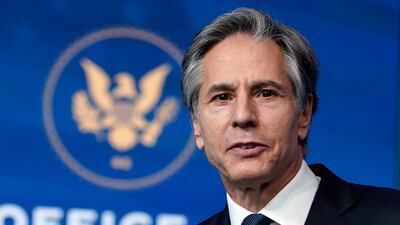A possible breakthrough in bringing Iran back into the 2015 nuclear agreement and getting the US to lift sanctions is possible within “the next days or a week”, the EU’s foreign affairs representative said.
Talks were now at “critical juncture” in reviving the deal, Josep Borrell said in Brussels.
He spoke after a virtual meeting of the EU’s Foreign Affairs Council in which US Secretary of State Antony Blinken had his first discussion with European ministers.
Mr Borrell said to prevent Iran’s continued nuclear developments it was necessary to bring back full implementation of the Joint Comprehensive Plan of Action and for the US to lift sanctions.
“This is the only way forward and is in the interest of global and regional security,” he said.
“I can tell you that intense diplomatic contacts are ongoing, including with the US.
"As JCPOA co-ordinator, it is my job to help to create the space for diplomacy and to find a solution … and I hope at the next stage there will be news.”
Mr Borrell said that “in the next days or week, we could prove that working together delivers results in this field”.
While Mr Blinken gave no indication that the US was yet willing to lift sanctions as a first move to halt Iran’s nuclear programme, he called for an accord that would “lengthen and strengthen” the 2015 deal.
On Monday he said he was pleased the US and European partners shared the same objectives regarding Iran.
“President Biden has been clear for some time that if Iran returns to compliance with its obligations under the nuclear agreement, the United States would do the same thing,” Mr Blinken said.
The US now has an invitation from the EU for an informal meeting of the Joint Commission of the Iran nuclear agreement.
The US, European partners, Russia, China and Iran have all been invited, and Mr Blinken said the US intended to be there.
“If it happens, would be the opening steps on a diplomatic path to seeing if we can resolve this issue,” he said.
Mr Blinken said that if Iran co-operated, the US would work with its partners to improve the nuclear agreement and confront other challenges posed by Iran, such as its destabilising activities in the region and its ballistic missile programme.
He said the US had made no upfront concessions, but that its policy towards Iran under the Trump administration had not produced results and that the problem had worsened.
“Iran is now much closer to being able to produce on short order enough fissile material for a nuclear weapon,” Mr Blinken said.
The US does not feel it has given up its leverage over Iran because all of the original sanctions are still in place.
“In fact, our leverage has now increased because we’re now, once again, on the same page with our European partners,” Mr Blinken said.
“Because they very much disagreed with the United States pulling out of the nuclear agreement, they were expending most of their energy on trying to keep the agreement alive, not in exerting pressure on Iran for some of the other egregious actions that it takes in the region and beyond.
“We’re now all in the same place and we’re united in purpose, and that’s a very powerful thing.”
While EU officials expect negotiations to be arduous, Washington has already indicated that it is willing to send its special envoy, Rob Malley, to meet Iranian officials.
Although US sanctions are hurting the Iranian economy, at an estimated cost of $150 billion, the regime still appears to be unyielding in its demand for them to be lifted before discussions.
“The US will not be able to rejoin the nuclear pact before it lifts sanctions,” Iran’s Foreign Minister, Javad Zarif, said on Sunday.
Mr Blinken will know that today’s discussions on Iran are going to be a significant foreign policy test of President Joe Biden’s administration.
Unpicking the sanctions, some imposed for Iran’s support of terrorism, will be challenging at home with Republicans and some Democrats strongly opposed to compromise.
Domestic politics are at play on both sides. There is a presidential election in Iran in June and with Iranian discontent over the economic hardship and Covid-19, the regime is likely to want to offer some relief to the people.
While supreme leader Ayatollah Ali Khamenei has publicly portrayed an uncompromising message, the economic and political realities may make Iran more flexible.
The potential for compromise has been helped after the nuclear watchdog, the IAEA, agreed to temporary measures for the next three months to offset Iran's decision to restrict access to inspectors.
But Iran has stated that from tomorrow it will halt snap UN nuclear work inspections.


